The Early Intervention Program (EIP) is designed for parents of deaf babies and young children from 0-3 years of age (that could be extended due to the gap in early detection). Family-based Early Intervention is a foundation which will determine greatly how the child’s future will be in means of personality, language development, and academically. It also determines the child’s self-esteem, independence, and level of integration into society. The Early Intervention Program (EIP) aims at providing to the family:
1. Full moral and psychological support (by interventionist and Support team and especially among families through the Support Group and other activities)
2. Information that is ought to help them be their child’s best advocate (by interventionist, EIP support team, resources, contact with other parents, deaf adults, other professionals, etc.).
3. The possibility to develop the skills that they need to provide to their child the best language learning opportunities, as well as to enhance his/her general development (instructed by interventionist, the support team, and through the John Tracy Clinic lessons as well as joint activities).
4. Guidance that helps parents communicate their child’s needs and interests with other professionals, decide for the most suitable mode of communication which they are ready to enhance, and make a choice of school that responds to their child’s needs (guided by the interventionist and the support team who seek information and guide the family while gradually helping them make their own search and confidently intervene with related professionals).
More details on the Early Intervention Program
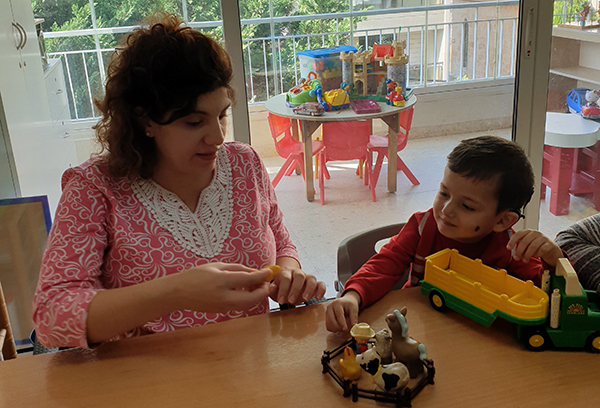
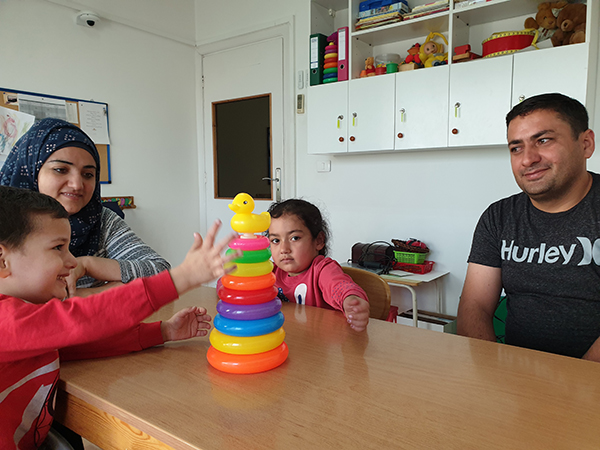
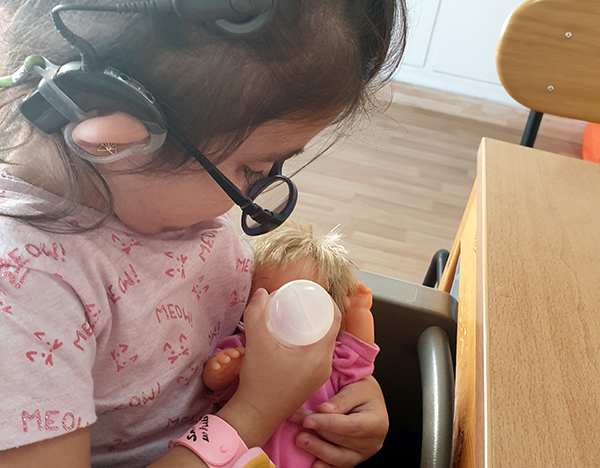
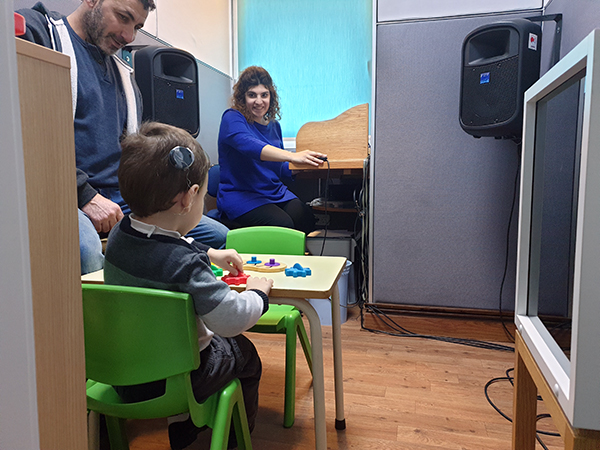
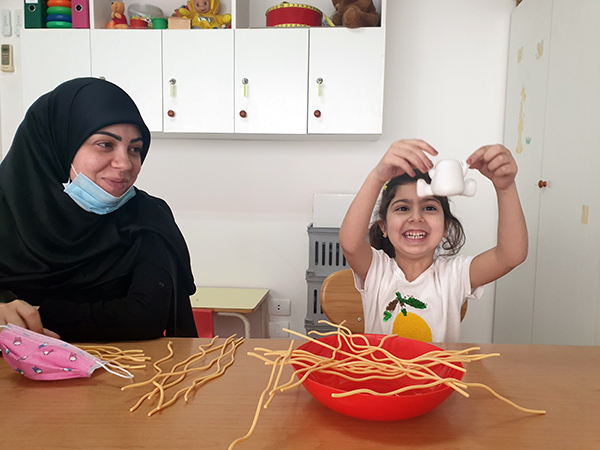
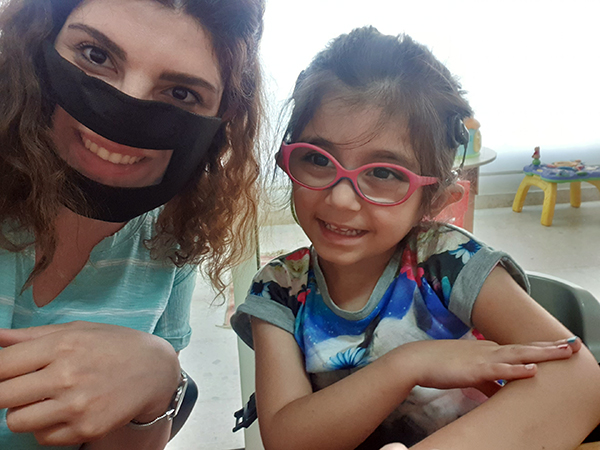
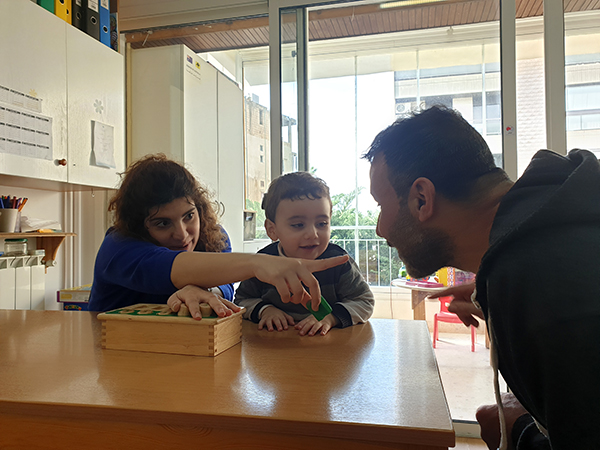
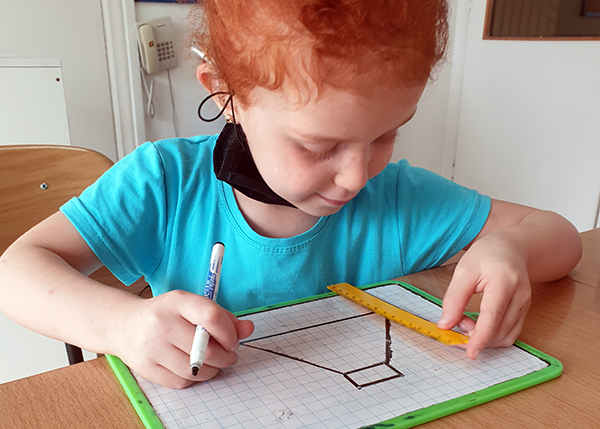
The most important aspect of this program is that it presents a reference place for support, information and services for the families of deaf children 0-3 years old (and older when needed), coming from different backgrounds, who may already know, or have just discovered, that their infant or young child is deaf, and consequently feel lost and do not know what to do. Unbiased information is put at their disposal to help them know about the possibilities and choices they have, which are also reviewed in the context of what is available in Lebanon, and meets their needs and priorities.
The support is provided to the family by the main therapist, the support EIP team, and other parents; in collaboration with other professionals.
The program services are provided through the Therapy Sessions, with the speech therapist/early interventionist, and through other activities which are coordinated by the whole EIP team, especially the activities which bring together the families of deaf children.
Besides the continuous on-going guidance and support (general discussions, assigned home objectives, follow-up for assessments, advise for referrals to other professionals or for school choices, etc.), the Early Intervention Program offers parents the Support Group meetings, where they can share feelings, worries, information and experience, under the guidance of a psychologist/family counselor; attempting to include other family members and/or key persons.
Parents come from both distant and closer areas. Those coming from closer areas can bring their child once a week, or twice when needed, to attend therapy sessions with the Speech and Language Therapist/Early Interventionist who works with the child (according to need of child and preference of family: Auditory-Verbal, Aural-oral, bilingual, etc.), and gives priority to the role of the family and the home objectives. Parents coming from distant areas may bring their child once a month for evaluation, and monitoring.
In addition to the parents/care-givers, it is important to include in the intervention process as many effective key persons as possible, in order to build around the child a strong and supportive team.
The EIP Support Team works together with, and in parallel to the Speech and Language Therapist/Early Interventionist, in a complementary manner, making sure that the start of the journey with the child and the family is a rich and healthy one. Besides the support and guidance provided by both, the Support Team ensures that necessary programs and activities are delivered in addition to the therapy sessions. This includes support and guidance to the family, application of activities outside the therapy room, meeting with other parents (on a parent to parent basis or more, including the Support Group meetings), and participation in Social Gatherings and Workshops, which are held to empower parents and strengthen their skills in a collaborative and interactive approach. The Support Team also makes Home Visits to study the home environment, and to give tips and instruction that are compatible with the child’s environment. These visits are also among the objectives aiming at supporting the parent/care-giver who is mostly involved in the program, as well as the whole family and other key persons. Special care is given to ensure that responsibilities are not falling on this parent/care-giver alone, but are divided to other key persons surrounding the child.
All parents benefit from the John Tracy Clinic sequential lessons, , which are translated and adapted to the Arab Language and Culture by the LCD with authorization from the clinic. These lessons help parents in a gradual manner to enhance their child’s whole development with stress on language development, and listening skills where applicable. Families enjoy these lessons because of their rich yet simple content, which is written with great consideration to the family’s feelings and the abilities of each individual child.
Resources are available to families through the LCD’s Resource Room which provides intensive information in relation to hearing loss and deaf issues, in addition to provision of trusted resources through the Internet and sometimes from experts; so that answers are almost always available to parents’ questions that are related to any subject concerning their child as a deaf child and as a child.
The Early Intervention Program helps parents in relation to Schooling Choice; to find the school (inclusive or specialized) that meets the child’s needs which differ from one child to another. When the child is enrolled in a school, the child and the family can still benefit from the EIP until the child is six years of age, and in some cases even further.
One of the services is the performance of Hearing Tests with the aim of reaching optimal amplification as quick as possible. Second hand hearing aids are sometimes provided, which are fitted by the hearing aid dealers, who kindly do the fitting for free.
For an effective early intervention to take place, hearing loss should be detected the earliest possible. Therefore, the LCD seeks every opportunity to encourage the possibility of applying Early Detection of Hearing Loss in Lebanon.
Occupational Therapy consultation and sessions are provided by a member of the Support Team, who gives tips for parents and conducts therapy sessions when needed.
Among the programs that the LCD initiated in order to serve the Early Intervention Program, is the specialized integrated Nursery, founded in the year 2004. The Nursery is Montessori oriented, mainly for hearing and hearing impaired children, where all benefit from a very rich environment in all means of development with special focus on language. Few years later, the LCD also initiated the integrated Preschool. As a result, the LCD has today the Diagnostic, Integrated and Montessori Oriented “Jip & Janneke” Nursery and Preschool (KG1-2).
Also and since the start of the Early Intervention Program Sign Language courses were provided to parents who chose Sign Language as a primary means of communication for their child, or in addition to oral communication. This service is equally accessible to teachers, therapists and other interested persons wishing to learn the Lebanese Sign Language.
Group Sessions for older kids from the EIP were started with the aim of gathering the children who went to school (regular, inclusive, or schools for the Deaf) with focus on targeting higher linguistic skills at the abstract and pragmatic level, and at creating a space to meet, socialize, exchange experiences, get empowered, and consolidate their identity.
With the help of the EIP team and especially friends of the LCD, The Joint Training Program has been initiated with the aim to benefit professionals from different NGOs/institutions. This program is very beneficial because of the absence of in-depth training in Lebanon in relation to hearing loss, and the inability of most NGOs to continuously and effectively train their staff.